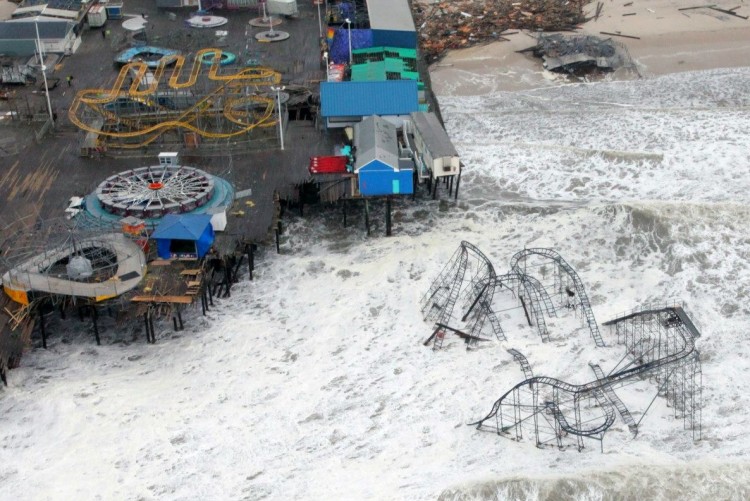
The latest hurricane disasters are yet another wake-up call. Climate change is happening and causing sea-level rise, worsening storm surges, increasing air temperatures that lead to more rainfall, and boosting water temperatures — all of which make storms more severe. July 2017 was the hottest month ever measured on earth, raising the temperature (up to 7.2 degrees Fahrenheit warmer than average) of the Gulf of Mexico, and making Harvey wetter and stronger, jumping to a Category 4 hurricane just hours before making landfall — an unprecedented event in decades of record keeping. Millions of people have been affected. People are in need of shelter and services, and just as we saw after Superstorm Sandy, damaged facilities are spewing toxic materials into communities, and public health is at risk.
Recognizing the urgency of the climate crisis, more than 50 organizations formed Jersey Renews; labor unions, faith leaders, community and environmental organizations are standing in solidarity and urging action. Climate change poses a massive threat to our coastal state, yet we believe that strong actions to counter it also offer an opportunity to prepare New Jersey for the future.
Economic cost of ignorance
There is an economic cost to ignoring climate change. According to the National Hurricane Center, Sandy caused $50 billion in economic damages. Even after flood waters recede, the effect on impacted communities may be felt for years. Unfortunately, the people hit the hardest, and who face the toughest recovery, are often poor, people of color, or otherwise vulnerable communities. Hourly workers whose employers are closed lose income they cannot recuperate, potentially pushing families into poverty. Both the scientific and the moral imperative for action are abundantly clear. According to a poll commissioned by the NJ League of Conservation Voters Education Fund, 71 percent want our next governor to be a leader in fighting climate change. Now is the time for our public officials to stand up to climate denial, and New Jersey must get serious about a real plan. The New Jersey Climate Adaptation Alliance recently released a policy review for state mitigation approaches that might be incorporated into a comprehensive, long-range, economy-wide climate action plan, the development of which should be immediately embarked upon with vigor, thoughtfulness, and resources within the first 100 days of the next administration.
Sector-specific targets
The plan should set sector-specific targets for all greenhouse-gas emissions, not just carbon reductions, particularly for the two largest sources: transportation and energy generation. A priority should also be placed on climate-mitigation policies that deliver important co-benefits, such as improving public health, stimulating job growth, and contributing to the development of livable communities.
State policies should equitably distribute the environmental, health, economic, and social benefits of climate actions and ensure that populations that are most affected by climate change, environmental justice communities, benefit the greatest from state policies. This includes directing public funds and providing incentives to those populations and communities that do not have the financial means to implement mitigation strategies, recognizing that approaches like upgrading homes to allow for energy efficiency upgrades and installation of renewables are cost-effective.
The state should adopt the monitoring and reporting program required by the Global Warming Response Act, to finally provide a transparent and reliable system for tracking trends and sources of emissions. New Jersey should incorporate climate-change impacts as part of major state planning and rulemaking efforts, and begin with the establishment of a consistent metric for monetizing the social cost of carbon, and then require all state agencies to incorporate that metric in state rulemaking, public spending, as well as any review of filings and cost-benefit analyses conducted by the Board of Public Utilities. Lastly, the state should implement specific strategies designed to promote technological innovation and bolster economic development:
-
updating the Renewable Portfolio Standard to increase New Jersey’s use of renewable energy to 30 percent of its overall supply by 2025, 50 percent by 2035 and 80 percent by 2050;
-
establishing an Energy Efficiency Portfolio Standard both for electricity and gas;
-
setting an ambitious goal for offshore wind power and establishing an offshore wind renewable energy credit program;
-
bolstering New Jersey’s zero-emission vehicle standard with consumer-purchase incentives and regulatory support to ensure installation of high-speed public electric-vehicle charging stations;
-
establishing mandatory leak detection and prioritizing replacement requirements for natural-gas compressor stations and distribution pipelines;
-
enhancing and enforcing the state’s current building codes to promote energy efficiency, making homes and businesses safer and more efficient.
A part of supporting impacted people means getting serious about why storms like Harvey, Irma, Maria, Sandy, and Katrina, and other extreme weather continue to happen more frequently and more severely. We need to shift the focus from response to planning and prevention.
By creating and implementing a comprehensive climate-action plan to cut greenhouse-gas emissions and reduce deadly air pollution, we may save New Jersey from being underwater, literally. It also presents an opportunity to move toward a sustainable future, create good, family-sustaining jobs, and grow New Jersey’s economy.
Dan Fatton is executive director of the New Jersey Work Environment Council, a co-founder of Jersey Renews, and advisory committee member for the New Jersey Climate Adaptation Alliance.